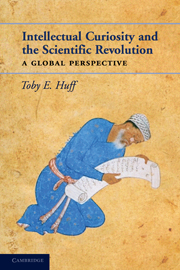Book contents
- Frontmatter
- Contents
- Illustrations
- Preface
- Acknowledgments
- Part I Something New under the Sun
- Part II Patterns of Education
- Part III Science Unbound
- 7 Infectious Curiosity I
- 8 Infectious Curiosity II
- 9 Infectious Curiosity III
- 10 Prelude to the Grand Synthesis
- 11 The Path to the Grand Synthesis
- 12 The Scientific Revolution in Comparative Perspective
- Epilogue Science, Literacy, and Economic Development
- Selected References
- Index
- References
12 - The Scientific Revolution in Comparative Perspective
Published online by Cambridge University Press: 05 June 2012
- Frontmatter
- Contents
- Illustrations
- Preface
- Acknowledgments
- Part I Something New under the Sun
- Part II Patterns of Education
- Part III Science Unbound
- 7 Infectious Curiosity I
- 8 Infectious Curiosity II
- 9 Infectious Curiosity III
- 10 Prelude to the Grand Synthesis
- 11 The Path to the Grand Synthesis
- 12 The Scientific Revolution in Comparative Perspective
- Epilogue Science, Literacy, and Economic Development
- Selected References
- Index
- References
Summary
The Revolutionary Grand Synthesis
The achievement of the modern scientific revolution, most elegantly put forth in the work of Sir Isaac Newton, was the outcome of a joint European adventure. It brought together extraordinary advances in optics, astronomy, and the science of motion, all governed by the law of universal gravitation. Whether we consider Newton's new unified system of terrestrial and celestial physics of 1687, or his even grander vision of that system augmented by particle attractions, magnetic, electric, and other forces acting “at a great distance,” the result is undeniably revolutionary.
The seventeenth century also witnessed great strides in pneumatics and electrical studies: advances in the former field would bring the steam engine, whereas those in the latter would bring electrification and an unimaginable new source of energy: electric power. It is difficult to imagine the Industrial Revolution without steam power and our modern digital world without electricity and its harnessing. Neither could any other part of the world get us there without first discovering and harnessing electric forces.
- Type
- Chapter
- Information
- Intellectual Curiosity and the Scientific RevolutionA Global Perspective, pp. 292 - 300Publisher: Cambridge University PressPrint publication year: 2010



